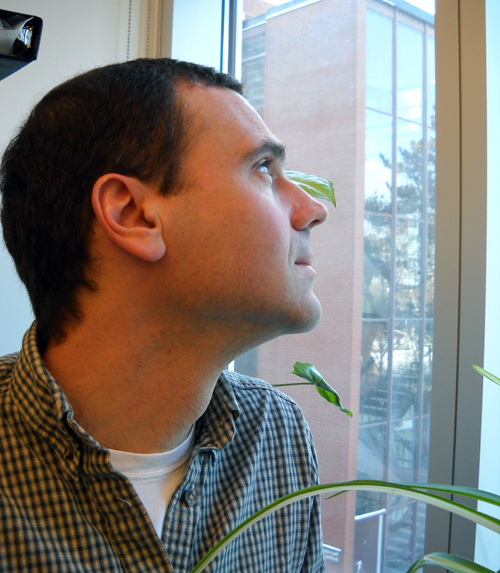
Are you a hawk or a dove? Is your personality fixed, or might you benefit sometimes by becoming more hawkish or more dovish? Finally, consider how your answers might change if you were a tree swallow.
Learning more about what drives animal behaviour led Gustavo Betini, a PhD student in integrative biology, to brave attacks by nesting birds during a two-year study that has shown personality differences between tree swallows.
He’s still trying to tease out what causes birds to be more passive or more aggressive. There’s likely a mix of factors at work, says Betini, including genetics, physiology and environment. But one thing is clear: swallows have individual personalities, and many can alter their character to suit changing conditions.
Pet owners routinely summon human qualities when they speak about their faithful dogs, finicky cats or flighty birds. But when it comes to tree swallows, surely it’s all just impersonal animal behaviour at work ─ the stuff of genes, hormones and, well, animal instincts.
Betini acknowledges that zoologists have traditionally considered individual variation between their study subjects as so much statistical noise. But he says that’s changing. “Recently there’s been increasing interest in consistent differences between individuals,” says Betini, who grew up in Brazil and studied biology at the University of Sao Paulo.
Acknowledging that researchers define personality in different ways, he says: “The idea of personality to me is consistent behaviour. If you are aggressive, you are always aggressive. Even if you change your aggressiveness, you are consistent in the way you do it. If you’re an outgoing person all the time, it’s part of who you are.”
(He’s not the only Guelph biologist to consider animal personality. In 2007, Prof. Rob McLaughlin, Integrative Biology, published a study that linked personality traits with survival prospects in brook trout.)
Each spring, tree swallows (Tachycineta bicolor) return from the southern United States and Central America to breed and raise their young in the U of G Arboretum and Guelph Turfgrass Institute. Stand out there near one of the roughly 150 pole-mounted nesting boxes used by various cavity nesters, and you’ll rouse different reactions.
That’s what Betini did for two field seasons. In spring 2008 and 2009, he visited the sites almost daily to monitor the birds; undergrad students helped in collecting data. He arrived at the Arboretum at about 5 a.m. each day and spent two or three hours moving between boxes, depending on the birds’ nesting activity. Standing for five minutes at each box, he recorded the swallows’ activity.
That activity varied. Some birds circled in a holding pattern well out of reach. Others swooped within a finger’s length on each pass. Some approached him periodically; others attacked more than 100 times within five minutes. Various birds emitted different cries or showed their agitation in other ways.
Betini spent the rest of the day catching and releasing birds ─ each banded for easy identification ─ and performing other study tasks.
He found that individual birds often acted in the same way from one visit to the next. After controlling for date, nesting stage and weather, Betini learned that he could predict how aggressive various birds would be ─ a measure of personality differences. “We found individual variation accounted for 50 per cent of variation in nest defence.”
He says this is the first study to investigate personality in tree swallows. Other researchers have suggested aggressiveness is linked to brood or clutch size, or perhaps response to predators.
It’s also the first time biologists have considered how personality and plasticity might work together to influence reproductive success in tree swallows. Plasticity measures how well individuals adjust to changes in the environment, such as temperature. Often personality and plasticity are considered as opposites, suggesting that your strong personality makes it more difficult for you to change.
Betini found that more aggressive birds were better able to adjust their behaviour to temperature changes. More aggressive males fledged more young, but plasticity appeared to benefit only non-aggressive males. For females, reproductive success appeared to be affected by neither personality nor plasticity.
Explaining those results is a challenge, particularly in teasing out the tradeoff effects of factors like genetics, food availability and energy budgets. “When you look at animal behaviour, you can’t just hypothesize about one thing or another.”
Animal behaviour includes human behaviour, of course. “I always think about myself when I’m doing this work and how can I know myself a little bit better,” says Betini, describing himself as a fairly even-keeled individual.
He used to get worked up over watching soccer and other sports in Brazil, an indicator of aggressiveness that’s hardly peculiar to him. He found a simple remedy: watch fewer sports. “Sometimes I behave in ways I shouldn’t, and I don’t have control.”
He worked in environmental consulting for about 10 years before beginning his doctorate with Prof. Ryan Norris on the evolution of migration.
Norris says understanding how individuals differ can help in predicting how they will cope with environmental stresses or changes. That applies not just to tree swallows but to other animals. “Animals, just like us, have differences,” he says. “You and I have different personalities, and so do two tree swallows. To understand how well you’re going to respond to environmental change ─ this difference could be a big component of that.”
The tree swallow project developed as a sideline while Bertini was volunteering with Norris. Bertini noticed just how aggressive some of those tree swallows could be and wondered why they bothered. “They’re spending so much energy defending their nest; there must be a link with their reproductive success.”
Bertini’s wife, Raquel Souza Dias, is a post-doc in the Department of Animal and Poultry Science; they have a two-year-old daughter, Julia.